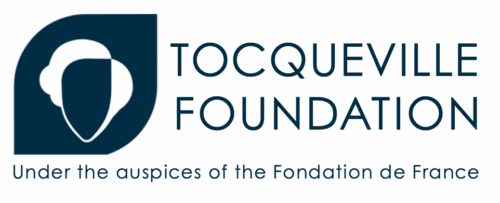The Tocqueville Foundation – June 19th, 2020
Following the postponement of the third edition of The Tocqueville Conversations, a very rich discussion was nevertheless held on Friday, June 19, in the form of a videoconference. Moderated by Ana Palacio (former Minister of Foreign Affairs of Spain), this conversation brought together Andrew A Michta (Dean of the College of International and Security Studies at the George C. Marshall European Center), Pavel Fischer (President of the Commission for Foreign Affairs of the Czech Senate) and David Goldman (Essayist and Investor, Asian Times. Author of “You will be assimilated, China’s Plan to Sino-form the World”) on the following topic: Western truth, Chinese truth: The Transatlantic Alliance and the Challenge of China. As we go through a particularly trying year, as Jean-Guillaume de Tocqueville pointed out by way of introduction, China’s role on the world stage is increasingly being questioned.
Indeed, Andrew Michta started the discussion by recalling that since the end of the Cold War, China had become the main challenge for the United States and its European allies, first from a political and commercial point of view, and now militarily speaking. The fact that China is currently increasing its military force, coupled with the fact that its main ally remains Russia, requires the West to radically rethink its relations with China. While this is not a recent issue, the coronavirus crisis has shaken the world order and compressed the timeline.
David Goldman then insisted on the historic period we are experiencing today. According to him, the only way to avoid a dangerous Chinese assimilation is to build a transatlantic program designed to accelerate the development of technology (including research on hardware and artificial intelligence), in order to keep the West ahead from China. If the US is willing to invest money in this area and to set up ambitious partnerships with Europe, there is still time to outcompete China.
Pavel Fischer, on the other hand, reiterated the need for a united and coherent Europe in its approach to China. To this end, he pointed out that we still lack knowledge and expertise on Chinese culture and society, its history and language, which is not conducive to making good decisions. Today more than ever, Europe also needs an elite capable of thinking in a way that puts the common interests of the member states back at the center. According to them all, the coronavirus crisis proved that the countries forming the Transatlantic Alliance were too dependent on China and needed to work on reversing this harmful trend. Indeed, multilateralism will not be an option as long as China refuses to comply with international guidelines, including health regulations. That is the reason why Western governments have to be able to propose effective and profitable alternatives to companies currently dealing with China so that they can fall back on existing national potentials.
Sophie Cabanis

